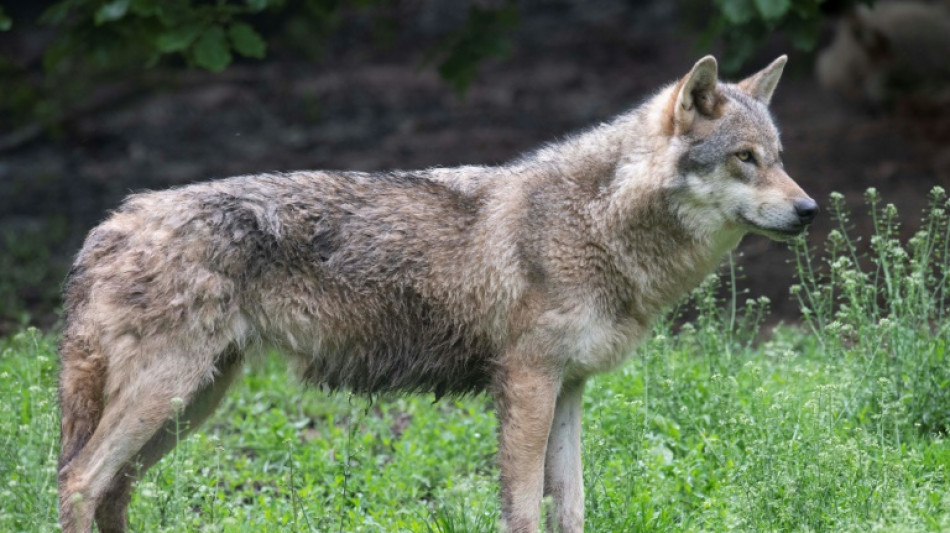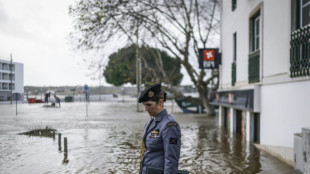
-
 Italy set for Winter Olympics opening ceremony as Vonn passes test
Italy set for Winter Olympics opening ceremony as Vonn passes test
-
England's Jacks says players back under-fire skipper Brook '100 percent'

-
 Carrick relishing Frank reunion as Man Utd host Spurs
Carrick relishing Frank reunion as Man Utd host Spurs
-
Farrell keeps the faith in Irish still being at rugby's top table

-
 Meloni, Vance hail 'shared values' amid pre-Olympic protests
Meloni, Vance hail 'shared values' amid pre-Olympic protests
-
Olympic freestyle champion Gremaud says passion for skiing carried her through dark times

-
 US urges new three-way nuclear deal with Russia and China
US urges new three-way nuclear deal with Russia and China
-
Indonesia landslide death toll rises to 74

-
 Hemetsberger a 'happy psychopath' after final downhill training
Hemetsberger a 'happy psychopath' after final downhill training
-
Suicide blast at Islamabad mosque kills at least 31, wounds over 130

-
 Elton John accuses UK tabloids publisher of 'abhorrent' privacy breaches
Elton John accuses UK tabloids publisher of 'abhorrent' privacy breaches
-
Lindsey Vonn completes first downhill training run at Winter Olympics

-
 Digital euro delay could leave Europe vulnerable, ECB warns
Digital euro delay could leave Europe vulnerable, ECB warns
-
Feyi-Waboso out of England's Six Nations opener against Wales

-
 Newcastle manager Howe pleads for Woltemade patience
Newcastle manager Howe pleads for Woltemade patience
-
German exports to US plunge as tariffs exact heavy cost

-
 Portugal heads for presidential vote, fretting over storms and far-right
Portugal heads for presidential vote, fretting over storms and far-right
-
Suicide blast at Islamabad mosque kills at least 30, wounds over 130: police

-
 Russia says Kyiv behind Moscow shooting of army general
Russia says Kyiv behind Moscow shooting of army general
-
Greenland villagers focus on 'normal life' amid stress of US threat

-
 Iran, US hold talks in Oman after Trump military threats
Iran, US hold talks in Oman after Trump military threats
-
Stocks waver as tech worries build

-
 Dupont, Jalibert click to give France extra spark in Six Nations bid
Dupont, Jalibert click to give France extra spark in Six Nations bid
-
'Excited' Scots out to prove they deserve T20 World Cup call-up

-
 EU tells TikTok to change 'addictive' design
EU tells TikTok to change 'addictive' design
-
India captain admits 'there will be nerves' at home T20 World Cup

-
 Stellantis takes massive hit for 'overestimation' of EV shift
Stellantis takes massive hit for 'overestimation' of EV shift
-
'Mona's Eyes': how an obscure French art historian swept the globe

-
 Iran, US hold talks in Oman
Iran, US hold talks in Oman
-
Iran, US hold talks in Oman after deadly protest crackdown

-
 In Finland's forests, soldiers re-learn how to lay anti-personnel mines
In Finland's forests, soldiers re-learn how to lay anti-personnel mines
-
Israeli president visits Australia after Bondi Beach attack

-
 In Dakar fishing village, surfing entices girls back to school
In Dakar fishing village, surfing entices girls back to school
-
Lakers rally to beat Sixers despite Doncic injury

-
 Russian pensioners turn to soup kitchen as war economy stutters
Russian pensioners turn to soup kitchen as war economy stutters
-
Japan taps Meta to help search for abuse of Olympic athletes

-
 As Estonia schools phase out Russian, many families struggle
As Estonia schools phase out Russian, many families struggle
-
Toyota names new CEO, hikes profit forecasts

-
 Next in Putin's sights? Estonia town stuck between two worlds
Next in Putin's sights? Estonia town stuck between two worlds
-
Family of US news anchor's missing mother renews plea to kidnappers

-
 Spin woes, injury and poor form dog Australia for T20 World Cup
Spin woes, injury and poor form dog Australia for T20 World Cup
-
Japan's Liberal Democratic Party: an election bulldozer

-
 Hazlewood out of T20 World Cup in fresh blow to Australia
Hazlewood out of T20 World Cup in fresh blow to Australia
-
Japan scouring social media 24 hours a day for abuse of Olympic athletes

-
 Bangladesh Islamist leader seeks power in post-uprising vote
Bangladesh Islamist leader seeks power in post-uprising vote
-
Rams' Stafford named NFL's Most Valuable Player

-
 Japan to restart world's biggest nuclear plant
Japan to restart world's biggest nuclear plant
-
Japan's Sanae Takaichi: Iron Lady 2.0 hopes for election boost

-
 Italy set for 2026 Winter Olympics opening ceremony
Italy set for 2026 Winter Olympics opening ceremony
-
Hong Kong to sentence media mogul Jimmy Lai on Monday


How a lone 'immigrant' wolf revived a forest ecosystem
In 1997, a lone wolf crossed an ice bridge that briefly connected Canada with the remote Isle Royale, which lies off the coast of Michigan in Lake Superior and is renowned for its rich biodiversity.
His arrival revived the flagging fortunes of the wider wolf population, which had been hit by disease and inbreeding, and triggered cascading effects that improved the health of the overall forest ecosystem, a study in Science Advances showed Wednesday.
"Issues like inbreeding and low genetic diversity are an important concern for scientists," first author Sarah Hoy, an ecologist at Michigan Technical University told AFP.
"But this is the first study that shows when you have these genetic issues, they don't just impact the particular population and increase the risk that they will go extinct: they also have these really big knock on effects on all the other species."
- 'Old Gray Guy' -
The first wolves arrived on the island in the late 1940s, and their main prey are moose -- giving rise to the longest running study of a predator-prey system anywhere in the world.
But by the 1980s, the wolves were in trouble due to the arrival of canine parvovirus which drove their numbers down from a high of 50 to around 12.
Though the disease eventually disappeared, the population didn't recover right away. The reason was severe inbreeding, which caused lower reproductive success, as well as poorer health outcomes such as spinal deformities of the kind often seen in purebred dogs.
"If you're a wild wolf and you're having to take down prey like a moose that's eight times your size, that can make life in the wild really tough for you," Hoy said.
Enter the immigrant, identified as "M93" by scientists, but affectionately nicknamed "The Old Gray Guy."
M93 was unrelated to the existing population, and also had the advantage of being unusually large -- a big benefit when defending turf from rivals or taking down 800 pound ungulates.
He quickly became the breeding male in one of the island's three wolf packs and went on to sire 34 pups, greatly improving the genetic health of the population and the kill rate of its prey.
- Restoring balance -
Moose are voracious herbivores, consuming up to 30 pounds (14 kilograms) of vegetation a day. By reducing their numbers, the wolves helped bring the forest back into balance, which was most notable in the effects on balsam firs -- the species commonly used as Christmas trees.
With fewer moose, the trees began growing at rates not seen in decades, which is vital for the renewal of the forest and the myriad plant and animal species that depend on it.
The benefits brought by M93's arrival lasted around a decade, then the situation deteriorated once more -- ironically as a result of his extreme reproductive success.
By 2008, two years after his death, 60 percent of the wolf population's gene pool was inherited from M93, which led to a return of genetic deterioration.
M93 himself began breeding with his daughter after his mate died, and simultaneous inbreeding by other members triggered a rapid population decline until 2015, when there were just two wolves left: a father-daughter pair who were also half siblings.
Fortunately, a restoration program beginning in 2018 has once more brought balance to the system, and there are currently around 30 wolves and just under a thousand moose on the island.
For Hoy, a key takeaway is that the same principle of inserting just a small number of individuals could be applied to other imperiled predator populations that suffer from the harmful effects of inbreeding, such as lions or cheetahs, to similarly improve their ecosystems.
William Ripple, a professor of ecology at Oregon State University who was not part of the research, told AFP it was an "important study" that advances understanding "by showing that genetic processes may limit the ecological effects of a keystone species, the gray wolf."
U.Shaheen--SF-PST




